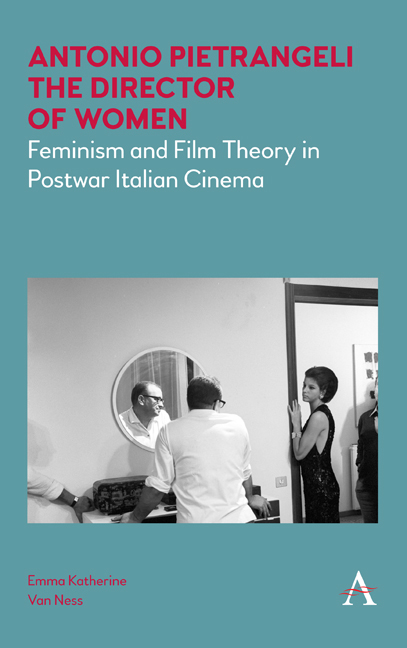Book contents
- Frontmatter
- Dedication
- Contents
- List of Illustrations
- Acknowledgments
- Vita
- Introduction: Antonio Pietrangeli, A Brief History
- Chapter 1 Pietrangelian Film Theory: From Neorealism to Feminism
- Chapter 2 Maid from the Margins: Il sole negli occhi
- Chapter 3 The Coming of Age of a Teenage Bride: Nata di marzo
- Chapter 4 Legally Bound: Political Realism and Prostitution in Adua e le compagne
- Chapter 5 Fantasmi a Roma: Sur-Realism and the Time-Image
- Chapter 6 The Dora Problem: La parmigiana, Piatti, Pietrangeli and Freud
- Chapter 7 Too Much Woman: Marriage, Power, and Excess in La visita
- Chapter 8 Breaking Faith: Il magnifico cornuto, Envy and the Crisis of Vision
- Chapter 9 Io la conoscevo bene … Or did I? Antonio Pietrangeli, the Author and the Actress
- Conclusion: Antonio Pietrangeli, Feminism and Film Theory
- Bibliography
- Index
Chapter 6 - The Dora Problem: La parmigiana, Piatti, Pietrangeli and Freud
Published online by Cambridge University Press: 06 May 2020
- Frontmatter
- Dedication
- Contents
- List of Illustrations
- Acknowledgments
- Vita
- Introduction: Antonio Pietrangeli, A Brief History
- Chapter 1 Pietrangelian Film Theory: From Neorealism to Feminism
- Chapter 2 Maid from the Margins: Il sole negli occhi
- Chapter 3 The Coming of Age of a Teenage Bride: Nata di marzo
- Chapter 4 Legally Bound: Political Realism and Prostitution in Adua e le compagne
- Chapter 5 Fantasmi a Roma: Sur-Realism and the Time-Image
- Chapter 6 The Dora Problem: La parmigiana, Piatti, Pietrangeli and Freud
- Chapter 7 Too Much Woman: Marriage, Power, and Excess in La visita
- Chapter 8 Breaking Faith: Il magnifico cornuto, Envy and the Crisis of Vision
- Chapter 9 Io la conoscevo bene … Or did I? Antonio Pietrangeli, the Author and the Actress
- Conclusion: Antonio Pietrangeli, Feminism and Film Theory
- Bibliography
- Index
Summary
The question whether a woman is “open” or “shut” can naturally not be a matter of indifference.
— Sigmund Freud, footnote from “Fragment of an Analysis of a Case of Hysteria (‘Dora’)”
The Spectator and the Reader: Dora and Pornography
In consulting Pellizzari's study of the critical reception of La parmigiana (1963), one is instantly struck by the level of intellectual vitriol provoked by the film and its protagonist, Dora (Catherine Spaak). Although there were exceptions, many critics from both rightand left-wing publications seem to agree on one thing: the film's vulgar and pornographic nature. Catherine Spaak, an actress known for her willingness to take risks in her selection of roles, including Una ragazza di nome Francesca (Enrico La Stella), La noia (Alberto Moravia) and La calda vita (Quarantotto Gambini), discusses the rigors of shooting the film with Pietrangeli as well as the scandal the film caused in an interview with Marta Poretti. This scandal of the film mirrors another scandal in the life of the actress; she was pregnant during the shooting of the film. She would later give birth to her daughter, Sabrina, and marry the father of the child, Fabrizio Capucci, at 18, despite her father's disapproval. When her child was only seven months old, Spaak filed for divorce and tried to flee to France with Sabrina. She was stopped at the border and placed on house arrest in Rome. This biographical note serves to further illuminate the link between Spaak's own rebellious personality and the on-screen rebellion of the women she portrayed, life imitating art.
This chapter will discuss Pietrangeli's depiction of Dora's ability to see beyond gendered, hypocritical, double standards regarding sexuality. This chapter will also pay particular attention to the film's dialogue. As the following analysis will show, it is Dora's “openness” in both speech and sexual action that defines her and makes her such a problematic figure for certain representatives of patriarchy, both within the film's narrative and those commenting on the film. Borrowing the line of criticism from Hélène Clément and Catherine Cixous's analysis of Freud's Dora case in La jeune nèe as well as Gallop's essay “Keys to Dora,” this chapter will show how Pietrangeli's Dora is marked by her openness, her willingness to access her sexuality and to censure with her speech.
- Type
- Chapter
- Information
- Antonio Pietrangeli, The Director of WomenFeminism and Film Theory in Postwar Italian Cinema, pp. 133 - 158Publisher: Anthem PressPrint publication year: 2020



